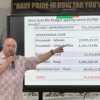
IT should be alarming to hear a public figure — a former lawmaker no less — complain that the profits of foreign investors “leave the island.” It is an economically unsound notion, tied to the similarly widespread and fallacious belief that money is wealth.
According to economist Thomas Sowell, the first thing we should remember is that economic transactions are not a zero-sum process. In a legitimate business transaction, both sides must gain; otherwise, there’s no reason to make the deal.
As anyone acquainted with NMI history would know, the Commonwealth achieved spectacular economic growth in the late 1980s and mid-1990s because of the presence of major foreign investors. The revenue they provided to the CNMI government allowed it to fund college scholarship programs, open homestead subdivisions with the required infrastructure, provide utility services and public health programs, including medical referrals. Many roads were paved, new schools were built, typhoon-proof houses were constructed. The CNMI became less dependent on federal funding assistance. There were more jobs for local residents both in the public and private sectors. There were more business opportunities for local entrepreneurs and property owners. There were more commodities and choices for consumers and more recreational activities for tourists and locals alike. There were more regular flights serving the Northern Marianas, and most were conveniently scheduled. Life in these small and remote islands with not a lot of resources became more convenient, more pleasing. (There were, to be sure, problems, too, in those days, but a cash-strapped, debt-ridden government was not one of them.)
Without investors, in any case, there will be no profit to speak of. And where capital cannot get out easily, it is less likely to go in the first place, as Sowell and other economists have pointed out.
This brings us back to the economic concept first popularized in the 18th century by Adam Smith. In Sowell’s words: “It is not money but the volume of goods and services which determines whether a country is poverty stricken or prosperous.” Otherwise, he added, the government could make us all rich by simply printing more money. (The current CNMI administration’s corollary — and equally mistaken — belief is that the islands could be rich again if the feds give local politicians more money, again.)
In his superb book, the fifth edition of “Basic Economics,” Sowell discussed foreign investments in the U.S., and noted that by the early 21st century, America received more than twice as much foreign investment as any other country in the world. So is the U.S. “losing out” because the foreign investors’ profits are “leaving” America?
There is “probably no country in history from which foreigners have carried away more vast amounts of wealth than the United States,” Sowell wrote. “By that reasoning, Americans ought to be some of the poorest people in the world instead of consistently having one of the world’s highest standards of living. The reason for that prosperity is that economic transactions are not a zero-sum activity. They create wealth.”
Now and then — especially when the local economy is sputtering — there’s talk of “self-sufficiency” and why the CNMI should strive for it. But I wonder: do those who advocate for the islands to be “less dependent on the outside world” truly understand the consequences? Chief among them is the further shrinking of the local economy — meaning less revenue for a ravenous government, whose “compassionate” elected officials are always eager to spend other people’s money on voters.
If that sounds acceptable, then it’s time to start discussing the massive fiscal adjustments the CNMI government must undertake to continue operating in an economy with fewer foreign investors. Which departments, divisions, bureaus, offices, agencies or programs should be downsized or closed? How many government employees will either get a pay cut or a pink slip? How much should the remaining government employees pay more for their health insurance? Who will tell the retirees that they can no longer receive their 25% benefit?
And without enough foreign investors to underwrite the islands’ only industry, tourism, how can the CNMI pay for its imports? These include vehicles, fuel, laptops, machinery, heavy and other types of equipment, telecommunications technology, clothes, medicine, food, construction materials, furniture, appliances, among many other things.
There was a time when the Northern Marianas did not have a lot of businesses — and people — and the only “industry” was the government. That was during the Trust Territory days, and most of the people back then knew what they wanted: economic development.
One final advice from Sowell:
“Nothing is easier than to have good intentions but, without an understanding of how an economy works, good intentions can lead to counterproductive, or even disastrous, consequences…. Many, if not most, economic disasters have been a result of policies intended to be beneficial — and these disasters could often have been avoided if those who originated and supported such policies had understood economics.”
Send feedback to editor@mvariety.com











